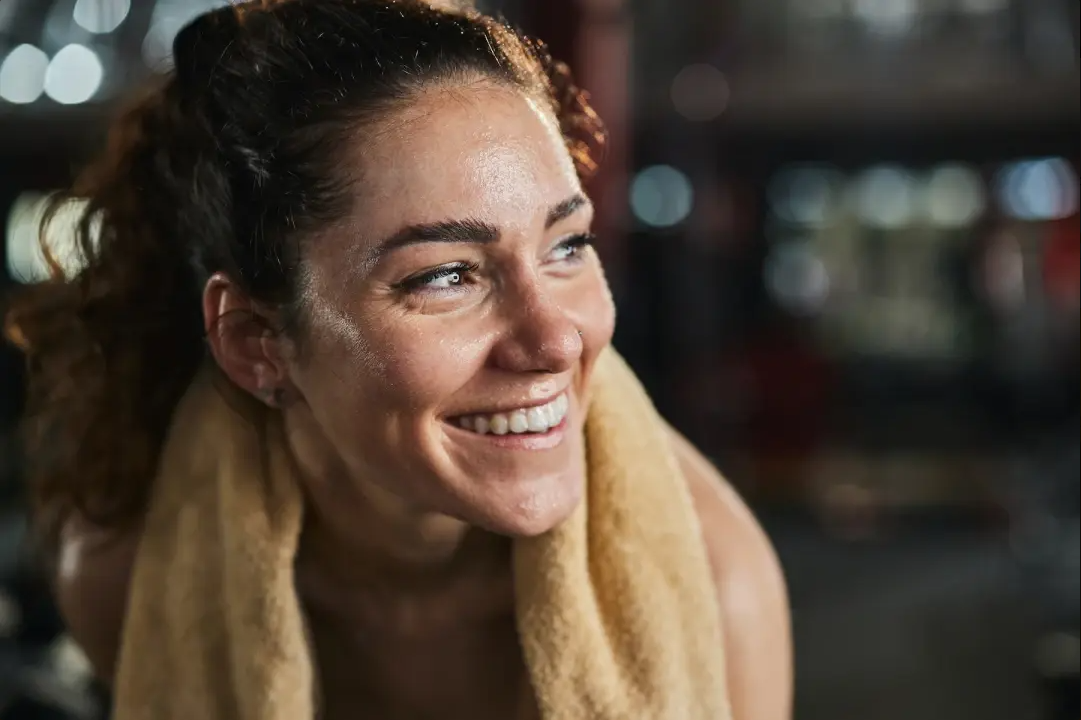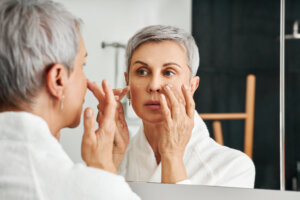Read Full Article HereAs it turns out, sweating does much more than keep you cool during exercise.
You might view sweat as an annoying side effect of your workout, but it’s actually the stuff that allows us to work out safely in the first place. During exercise, our heart rate and core body temperature increase, and we need sweat—our body’s primary cooling mechanism—to release that heat, explains exercise physiologist Micah Zuhl, PhD, a professor at Central Michigan University.
But beyond the very important purpose of preventing your body from overheating, there are a few other benefits of sweating that might surprise you. For example, did you know sweat can actually help prevent acne and keep you safe from certain bacteria?
Below, a few surprising health benefits of sweating, according to health experts.
1. Sweat Hydrates the Skin
For sweating to be effective at cooling us down, it must evaporate, Zuhl says. And when it does, our skin is left with a gritty feeling thanks to the residue of sodium chloride (salt) and minerals in our sweat, explains Jennifer Sawaya, MD, a board-certified dermatologist with U.S. Dermatology Partners Scottsdale. While this might not feel very nourishing, sweat also contains other beneficial properties that are working quietly behind the scenes to nourish our skin.
For example, in addition to water and electrolytes, sweat contains antimicrobial peptides, metabolically active substances, and oils and lipids that help hydrate the skin and maintain a healthy pH and skin microbiome, says board-certified dermatologist Jennifer Chwalek, MD.
This is important work: “A healthy microbiome is important to prevent skin inflammation, infection, and support the barrier function of the skin,” Dr. Chwalek explains. In fact, studies suggest that impaired sweat function—and a lack of sweat’s beneficial properties—can be seen in those with atopic dermatitis (i.e. eczema), a chronic condition that causes skin dryness and inflammation.
So while sweat isn’t a replacement for moisturizing post-shower, it can help maintain a healthy skin barrier, which prevents water loss.
2. It Can Help Fight Acne (to a Degree)
You’ve probably read countless times that showering right after a workout is important to remove acne-causing bacteria that contribute to breakouts. And it’s true that wet workout clothes rubbing against the skin can clog pores and lead to pesky bacne, for example. But “the sweat itself is not the problem,” Dr. Sawaya says. In fact, sweat may actually help if you’re dealing with acne.
You can thank sweat’s antimicrobial peptides for that. “Acne is at least partially driven by bacterial growth. The antimicrobial properties in sweat can certainly help fight against some of these pathogenic bacteria,” Dr. Sawaya explains.
That’s not all: “Additionally, the process of sweating results in a natural cleansing of the pores,” says Brian W. Connor, MD, a board-certified dermatologist at Schweiger Dermatology Group in Brooklyn, New York. That means sweating can help clear out dirt and acne-causing bacteria.
But you don’t want any of that extra gunk you just sweat out to hang out on top of your skin for too long or it can have the opposite effect. That’s why it’s still important to shower ASAP after any sweat-inducing workout to “remove excess oils and impurities from the surface of the skin and prevent blocking pores, which can lead to acne,” Dr. Connor says.
3. Sweat May Protect You From Infection
In addition to maintaining a balanced skin microbiome and fending off acne, those antimicrobial peptides in our sweat can also help protect you from getting sick, Dr. Chwalek says.
A couple decades ago, researchers discovered that sweat secretes an antimicrobial peptide called Dermcidin which “may serve as a first line of defense against microbial pathogens,” according to a journal article in BMJ. That includes a variety of bacteria and fungi, including the bacteria Staph aureus and E-coli as well as the yeast, Candida albicans, Dr. Chwalek explains. In other words, this secret stuff in your sweat could fight off harmful microorganisms, safeguarding against everything from diarrhea to skin infections to even more serious staph infections.
So while it’s still important to clean your yoga mat and other gym equipment, it’s at least a little comforting to know your body is secreting a natural antibiotic to help protect you while you work out.
4. It Removes Some Toxins from the Body
Eccrine sweat glands, the ones primarily responsible for thermoregulation, release mostly water along with electrolytes like sodium, chloride, and potassium, Zuhl says. However, they can secrete toxins too—hence the anecdotal idea of “sweating out” the alcohol after a night of one-too-many drinks by going for a run.
Unfortunately, the scientific consensus is that sweating plays a minor role when it comes to “detoxifying” the body from alcohol or other toxins compared to the work of your kidneys and gastrointestinal tract, Zuhl says. But while sweating may not speed up detoxification in the way we might hope while nursing a hangover, studies have found concentrations of environmental toxins such as pollutants, BPA, and heavy metals in sweat, he says—meaning sweat may help usher other toxins out of our system.
5. It Makes Your Skin Glow
Unsurprisingly, that sweat-induced detoxification also has perks for our skin, helping to boost its glow. “Sweating enhances lymphatic drainage and detoxification, removing impurities from our bodies and skin that can dull our complexion,” Dr. Sawaya says.
Plus, if you’re working up a sweat from your workout, that also means you’re increasing blood flow to the skin—another way to amp up that radiance. “Exercise increases delivery of oxygen and vital nutrients to the skin which improves overall skin health, complexion, and, of course, provides that immediate and highly sought-after post workout glow,” Dr. Connor says.
6. It Can Prevent (and Even Reverse) Signs of Aging
Here’s another big benefit of getting sweaty: “Sweating, specifically sweating related to exercise, is proven to have anti-aging benefits, playing a role in keeping skin looking youthful and diminishing the appearance of fine lines and wrinkles,” Dr. Sawaya says.
Pretty good news, right? Here’s how it works: Sweating happens when there is improved blood flow to the skin during exercise, Dr. Chwalek says. “This leads to better oxygen and nutrient delivery to the skin, which helps with cell turnover and repair” she says — resulting in fewer age spots and signs of damage. At the same time, this increased blood flow can boost collagen production, which helps maintain the integrity and elasticity of the skin, Dr. Connor adds.
And remember when we said sweat helps maintain a healthy pH and microbiome? Well, research shows that that impacts not just how our skin looks and functions now, but also how it ages by regulating certain genes, Dr. Chwalek says.
The More You Sweat, the ‘Better’ You Sweat—and the Better You Perform
Sweat doesn’t just help keep you safe while you exercise — it also has the power to impact your performance.
As your aerobic fitness improves, your body becomes more efficient at cooling you down (meaning you might start sweating sooner into your workout), Zuhl says. That leaves your body with more energy to power your workout, allowing you to tolerate a longer or more intense training session.
The actual make-up of your sweat will also adapt over time. As your fitness level improves, your body will become better at conserving important electrolytes like sodium, resulting in sweat that’s more diluted, Zuhl says. And losing fewer electrolytes in your sweat can help prevent fatigue and muscle cramps—having a direct impact on your performance.
So, if you’ve noticed you’re sweating before you’ve hit the hardest push of class, or that your skin feels less gritty post-workout, these could both actually be signs all your hard work in the gym is paying off—and that your body is getting smarter at sweating, leaving you with even more benefits.
6 Benefits of Sweating That’ll Make You Extra Thankful for That Post-Workout Glow
October 16, 2024








